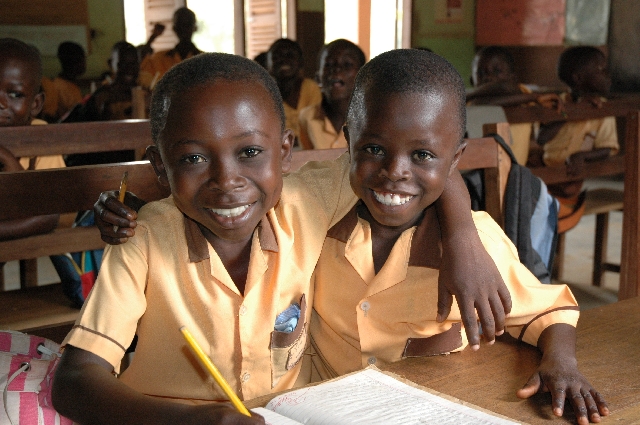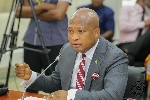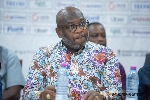Remove expenditure cuts from educational sector – CSOs petition IMF
 Happy pupils
Happy pupils
Civil Society Organizations in education are calling on the International Monetary Fund (IMF) to ensure expenditure in education funding is not cut.
In a three-page petition, the groups said prior to the staff-level agreement, the IMF team at a meeting in Accra with the CSOs assured participants of its commitment to protect social protection and related budgets from expenditure cuts, as part of the expenditure rationalisation conditionality which included basic education, the School Feeding Programme in primary schools, and cash grants to the poorest but the reversal is the case.
The CSO’s bemoaned that these pernicious expenditure cuts are happening at a critical time when one million Ghanaian children aged 4-18 are out of school, over 5,000 public basic schools exist under trees, sheds, and dilapidated structures, 2.3 million public basic school children do not have access to desks, and less than a quarter of primary school graduates are exhibiting minimum competencies in Mathematics and English.
“This is not only inimical to the attainment of universal basic enrolment and completion with relevant learning outcomes by 2030, but the sustenance of modest gains made recently in enhancing equitable access,” the petition said.
The CSO’s have, thus, called on the IMF Board to live up to its promises, remove the brutal cuts, and ensure the Government of Ghana is able to meet required conditions subsequent to final approval.
Read details of the petition below:
To: Executive Directors to the IMF
Dear Executive Directors,
Civil Society Petition to the IMF Board on Cuts in Ghana’s Basic Education 2023 Budgetary Allocation and Medium-Term (2023-2025) Expenditure Framework for Education and the Ghana School Feeding Programme
On 12th December 2022, the International Monetary Fund (IMF) reached a staff-level agreement with the Government of Ghana on economic policies and reforms to be supported by a new three-year arrangement under the Extended Credit Facility (ECF) of about US$ 3 billion. Ghana has since been working to meet the conditions precedent to a Board Level approval.
Prior to the staff level agreement, Civil Society representatives in Ghana held two meetings with the IMF team in Accra, during which the IMF assured participants of its commitment to protect social protection and related budgets from expenditure cuts, as part of the expenditure rationalization conditionalities. Specific areas of assurances were basic education, the School Feeding Programme in primary schools, and cash grants to the poorest.
However, the Medium-Term Expenditure Framework (2023-2025) presented to the IMF by the Government of Ghana, including the expenditure allocations in the Budget Statement for 2023 - the inception budget for the IMF Programme, indicates:
a. 12 per cent of the national budget allocated to education for 2023.
b. 11 per cent projected expenditure allocation to education in 2024 and 2025.
c. 3 per cent GDP allocation to education in 2023.
d. 2 per cent GDP allocation to education in 2024 and 2025.
e. 25 per cent decline in the projected expenditure allocation for the basic school feeding programme in 2025.
The allocations above are in sharp contrast with the minimum financing benchmarks established by the Global Partnership for Education (GPE) i.e. 15 per cent of national budget, and 4 per cent of Gross Domestic Product (GDP) allocated to education, which the majority of the IMF Board Member-countries agree to, support and have pledged to champion.
In the case of Ghana, the President, His Excellency Nana Akufo-Addo was recently selected as the GPE Education Financing Ambassador responsible for encouraging other countries in Africa to commit at least 15 per cent of their national budgets and 4 per cent of GDP to education, bearing in mind that effective and efficient financing is crucial for the attainment of the education Sustainable Development Goal (SDG 4) in sub-Saharan Africa.
The 2023 education budgetary cuts have not only reduced education’s share of the national budget and GDP, but severely affected, by over 40 per cent, the allocation of resources for providing teaching and learning materials in public basic schools (especially textbooks, which have been in short supply since a new curriculum was adopted four years ago), funds for managing basic schools (Capitation Grant), and basic school infrastructure.
Economically unrealistic allocations to the Ghana School Feeding Programme in the 2023 budget, coupled with projected freeze/cuts in the Programme’s expenditure allocation for 2024-2025 threaten to reduce the number of beneficiaries of the one hot meal a day intervention for 3.5 million public basic school children by up to 25 per cent. Today, Ghana School Feeding Programme caterers have declared a nationwide strike due to poor funding.
These pernicious expenditure cuts are happening at a critical time when 1 million Ghanaian children aged 4-18 are out of school, over 5,000 public basic schools exist under trees, sheds, and dilapidated structures, 2.3 million public basic school children do not have access to desks, and less than a quarter of primary school graduates are exhibiting minimum competencies in Mathematics and English. This is not only inimical to the attainment of universal basic enrolment and completion with relevant learning outcomes by 2030, but the sustenance of modest gains made recently in enhancing equitable access.
We, the undersigned Civil Society Organizations, with a membership of over 600, working across Ghana to promote access to quality basic education and social protection, call on the IMF Board to live up to its promises, remove these brutal cuts, and ensure the Government of Ghana is able to meet the following conditions subsequent to final approval:
a. Review the 2023 budget to reflect a minimum of 15 per cent national budgetary allocation and 4 per cent of GDP to education.
b. Restore the 40 per cent cuts in the basic education budget for goods and services.
c. Within the anticipated increase, make specific allocations for basic education infrastructure development.
d. Review the Medium-Term Expenditure Framework of the education sector to reflect a minimum of the 15 per cent national budgetary allocation and 4 per cent of projected GDP.
e. Reverse projected medium-term expenditure cuts to the Ghana School Feeding Programme and increase allocations in line with increasing inflationary trends.
The above demands are highly possible with expenditure cuts in the cost of government machinery, which is exceedingly high due to the large size of government.
Respectfully submitted.
Accra, Ghana.
27th April 2023.
Petitioning organizations:
1. Africa Education Watch.
2. ActionAid Ghana.
3. Oxfam in Ghana.
4. SEND Ghana.
5. World Vision Ghana.
6. School For Life.
7. Norsaac.
8. Coalition Against the Privatization and Commercialization of Education (CAPCOE).
9. Ghana National Education Campaign Coalition (GNECC), representing 48 CSOs across Ghana.
10.Northern Network for Education Development (NNED), representing 89 CSOs in the Northern parts of Ghana.
11.Ghana CSOs Platform on SDGs, representing 480 CSOs across Ghana.
Trending News

Ashanti NDC members protest return of former DVLA regional director
14:24
Ghana revokes diplomatic and service passports of former officials and non-state actors
13:12
MP for Awutu Senya West supports 53 tertiary students with scholarships
11:49
Defence Minister commends Erastus Asare Donkor for anti-galamsey reporting
01:03
DVLA to open six overseas offices to help curb fake Ghanaian licences abroad
11:54
Supreme Court dismisses injunction application against President Mahama in Chief Justice case
12:41
GA/R: Tragic fire claims life of 5-year-old girl at Adjei Kojo Sancity
11:36
National Chairman is attending to some urgent issues in Accra, he will join the tour after that - Justin Kodua
00:19
COCOBOD CEO urges return to core mandate of funding cocoa
11:28
Sam George throws shade at Afenyo-Markin over police assault claims
12:21



